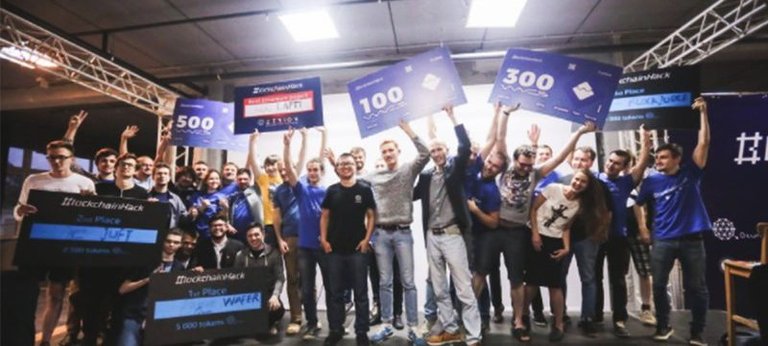Moscow's competition reflects the growth and prosperity of the blockchain industry in Russia

After blocking the interest of the Russian president Vladimir Putin on the sidelines of the World Economic Forum in St. Petersburg, Vitalik Buterin, with the digital currency of Ethereum, the Blocczin industry in Russia is growing more and more Development is. In June, the Blockacine and Bitcoin Conference was held in St. Petersburg and immediately thereafter, in Moscow, the hackathon (collective competition of computer programs at the last days of the contest) on the BlockchainHack site, attended by 150 rivals for the acquisition of 100 A thousand dollars of digital currency competed together.
The competition was held at the Paveletsky Art Center, a huge building in the city center of Moscow. Today, the art center has become a blockading technology center in Russia, and many developers and enthusiasts of the technology are working there. BTC Media, Qtum, Zerion, Waves, Token Fund and Blockchain School were responsible for managing and organizing the event, and the Russian Bitcoin community also supported it.
Hackathon is an event in which individuals involved in software development gather together and collaborate on software projects and sometimes hardware.
In the competition, winning teams have shown ambitious demos, including a mobile app for observing and investing in ICO (Early Auction of Crypto Currencies), an intelligence-based arbitration service, and a scoring system, The face recognition software that investors can use to quickly identify who each Blockacin project or ICO is in. Wafer, one of the winning teams, is demotically creating a distributed Wi-Fi network, using BlockChin technology Showed in which allowed routers It can sell traffic without dependence on certain software on the device.
In this way, intelligent contracts are used to ensure that all users pay for traffic and that a user can access the Internet after payment. Qtum is the largest sponsor and sponsor of the competition and is a member of Qtum Foundation. Many developers have designed their apps for use in Ethereum and Qtum. In fact, Qtum is a bloc blockade that combines the UTXO bitcoin transaction model with EVM Ethereum. The project started as a bitcoin fork, and later added to the abstract layer of the EVM, which would allow all etherium development tools to be available in Qtum. Among these tools are the smart contracts Solidity and Web3. For this reason, many of the etherium-based decentralized applications presented at this meeting have been developed in the Qtum Experimental Network.
The awards were presented in the form of Qtum, Waves, and Ether Tokens (ETH). The 5000th Token Qtum Award won over $ 50,000 to Wafer. Qtum also redeemed 2,500 and 1,000 tokens for the other two teams, with Waves 500, 300 and 100 Wave To the top three winners, they are appreciated. Waves itself, which was one of the winning teams in the competition, has developed a platform where investors can quickly identify who each ICO project is using by using face recognition software.
In the Ethereum group, the winning project, Zerion, has created a user interface for investors, which provides quick investment in ICOs. The team has won 10 ETH. Patrick Dai, co-founder of the Qtum project, told Bitcoin Magazine, "We can see why this event was the biggest blockaclin competition in Russia. Many developers have come up with new ideas. We want to promote these projects that can bring the world closer together and accelerate innovations. "We think the goal of Blockacchini technology is the same, and we are pursuing this goal in Qtum."
Alex Bash, co-founder of Zerion, told Bitcoin Magazine: "I personally inspired Wafer's idea. The Wafer team runs a protocol that allows users and routers to share (access) the Internet. Their idea is based on intelligent contracts that provide for both sides fair prices and conditions. The Lapti team has also developed a product that handles a "hot wallet" with a variety of currency exchanges, and after collecting statistics and analyzes, it collects payments in a single wallet. "
Each of the 25 teams participating in the event presented a demo of the software made over the weekend.
"In my opinion, in general, good results were obtained from this competition, and most teams not only had interesting ideas, but also provided realistic products and solutions at the weekend," Bash says. Rodion Mikhalev, director of the Blockchain Education Network in Russia, both in both The ceremony of the St. Petersburg conference and the Moscow competition, predicts that the Russian communications community will continue to grow fast.
"The Russian government approved and approved the concept of cryptographic currencies a few weeks ago, and now a new industry has been formed around Bitcoin technology," he told Bitcoin Magazine.
"In this competition, we saw a new and extraordinary phenomenon: a combination of smart and digital innovation with an emotion that tells the blocchin technology evolution," he said in another part of his speech. We will see that Russia will quickly play as a powerful center in the technology world. Here are plenty of good products and services to keep pace with BlockChin technology, "he said.
Of these comments, the acceleration of the process of developing blockchain technology in Russia was quite optimistic.
- ( Support my account / posts ( @haji ))
- ( The best is yours )
thanks for share. upvotes your post & you upvotes my post
Good news, thanks for sharing with us @haji!
Nice one